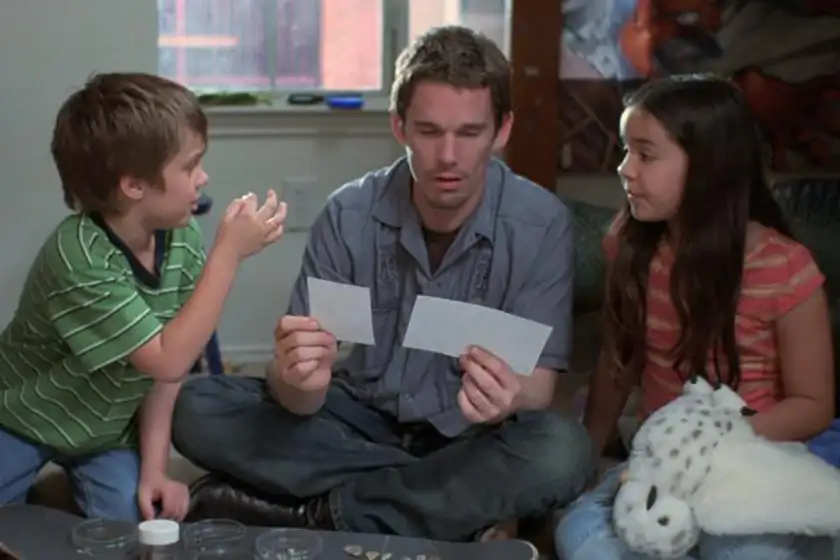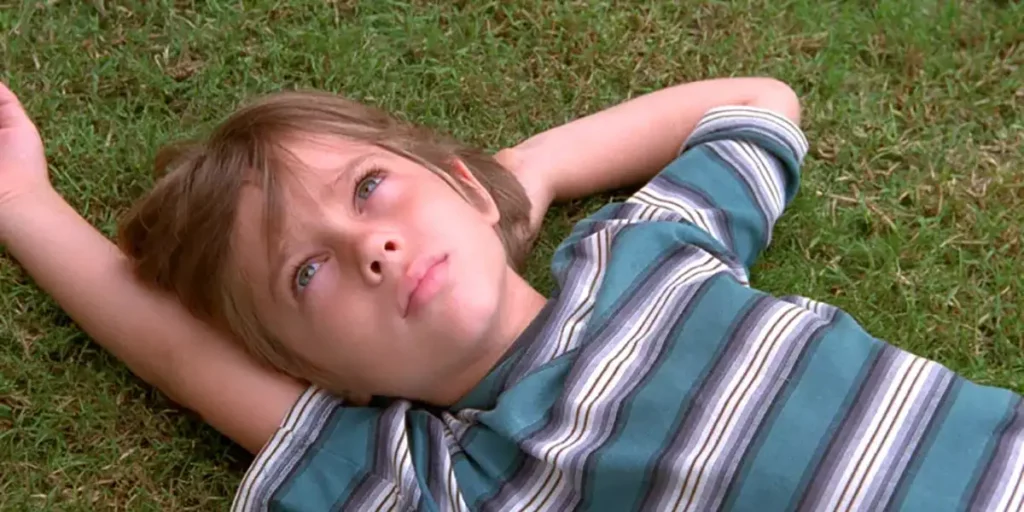Boyhood is a sprawling film about human life, an incredibly impressive technical feat from Richard Linklater that draws out the emotions.
Director: Richard Linklater
Genre: Drama
Run Time: 165′
Release Date: July 11, 2014
Where to watch: on digital & VOD
“Life doesn’t give you bumpers.”
Such sayings are spread all throughout Boyhood, a movie that attempts nothing short of encapsulating life itself with all its questions.
While the story follows Mason (Ellar Coltrane) from his time in Texas as a young boy leading up to his first year at college, Boyhood uses the characters around Mason to comment on all phases of life, and the lessons we as humans learn along the way. From politics and world affairs to music and art, Richard Linklater’s opus tackles humanity in an authentic way, something few other films can achieve without falling hopelessly into melodrama.
Linklater accomplishes his goal of securing a real-life feel thanks to his unique approach to filmmaking. Boyhood’s claim to fame is how Linklater, rather than casting different actors to play the characters at different ages, spent 11 years filming – from 2002 to 2013 – capturing the real maturing of Coltrane and his character. Many have critiqued this approach as merely a gimmick, but the audience should ultimately feel rewarded watching these characters and their real-life counterparts grow. Rather than using the typical movie-making magic, Linklater opted for something more real, making the film’s emotional weight feel much more magical.
This filmmaking strategy also offers future audiences the ability to see snapshots of the past. Knowing these scenes were filmed in the actual year the events take place adds a further sense of authenticity. Conversations surrounding the war in Iraq, the George Bush and Barak Obama administrations, and the potential of a new Star Wars film are interesting reminders of what life and social dialogue was truly like in those time periods, while also offering a sense of irony in hindsight.
While it might be easy to lob complaints at the young actors (you can see their acting chops improving as the film goes along and they are growing older), Coltrane and Lorelei Linklater, the daughter of Richard Linklater playing Mason’s sister, Samantha, get to play off some truly terrific performances. Ethan Hawke (Leave the World Behind), playing Mason’s father, molds his true personality with that of his character, waxing philosophic about art, music, and life while also channeling his character’s complicated past. Patricia Arquette, playing Mason’s mother, gets a grippingly emotional moment towards the film’s conclusion, crying while watching her son pack for college while lamenting her disappointment with her life: “I just thought there would be more.” Despite the A-list talent, the audience never really feels like they are watching actors on screen. The film feels instead like a look into reality.

This reality-driven style, from the behind-the-camera work to the performances, gives Linklater the opportunity to address several themes in Boyhood. The film deals with a multitude of multiplex issues in a way that feels natural. Linklater could be dubbed a master of “hangout” cinema. Boyhood, like other Linklater films, feature many scenes of people simply sitting around, talking while playing music or playing pool. It’s through these natural moments where the dialogue shines, illuminating the way complex human beings talk about and deal with complex issues at different ages. So, even if the film doesn’t always provide answers to these problems, it reveals the ways we as humans attempt to wade through them.
The quote at the beginning of this review could serve as the Boyhood’s thesis. Life is complicated. Answers are not always given to us. Bad things are bound to beset us. These truths could leave people asking, the way Mason asks his father, “So, what’s the point of any of this?” The film’s ending suggests Linklater’s personal answer to that question, the beauty in the everyday moments that capture us.
After moving into his college dorm, Mason goes to Big Bend Ranch State Park with some new friends, including a potential love interest. She tells him, while they both observe the beautiful scenery, that we don’t seize the moments; the moments seize us. We are enraptured by their beauty. So, perhaps the message of Boyhood is simply this: even though the questions and the problems can feel too heavy, even though it doesn’t have bumpers, life is still beautiful and worth living to the fullest. Linklater, in his visionary way, uses Boyhood to tell his audience this: Let the moments seize us.
Boyhood is now available to watch on digital and on demand.
Loud and Clear Reviews has an affiliate partnership with Apple, so we receive a share of the revenue from your purchase or streaming of the films when you click on the button on this page. This won’t affect how much you pay for them and helps us keep the site free for everyone.

